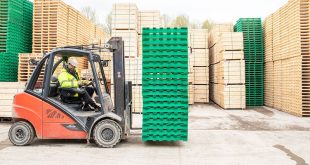Lafarge Cement have taken delivery of 48 bespoke, ‘environmentally-focused’ rail wagons for their Hope Works, in Derbyshire, as part of a £15 million rail expansion programme to supply builders merchants in the south east.

The wagons will be used to extend the company’s rail distribution operations for transporting cement to the south east following the end of clinker production at the Northfleet Works in Kent earlier this year. The development means that, each year, Lafarge will be able to replace 50,000 long distance lorry journeys in the UK by rail freight, using their network of 10 rail connected depots to provide ‘short-hop’ lorry journeys to final destinations.
The move is being supported by improvements at the West Thurrock depot, where new rail sidings were installed as well as discharging and loading equipment. Much of the product received by West Thurrock will be packed in waterproof plastic packaging that can reduce product wastage by over 10%, bringing cost and environmental benefits.
In addition to increasing the amount of cement moved by rail from Hope to around 1 million tonnes each year, the new rail wagons have been developed with up-to-date technology to reduce noise and impact on the surrounding environment. Taking product out by rail will replace an estimated 6,800 lorry loads around the Hope Valley, with only one additional train journey a week required to carry the extra tonnage.
The new stock is able to carry over double the load (nearly 80 tonnes) of the 320 existing wagons in the Lafarge UK fleet. Their prime role will be carrying cement in 22-wagon loads from Hope Works to depots in the south east, although their increased capacity means that over 100 fewer train journeys are required, offering further environmental benefits.
Dave Burley, Lafarge’s supply and distribution director says: “The arrival of these new wagons marks a significant landmark for two of Lafarge Cement business priorities. It is the final piece of the jigsaw for our major project to supply the south east, enabling us to ensure the reliability of supply to our customers in this busy market, following the end of clinker-making at Northfleet. The development also demonstrates our commitment to a more sustainable supply chain network, reducing CO2 emissions from transport and removing vehicle movements from UK roads.”
 Builders Merchants Journal – BMJ Publishing to Builders Merchants and the UK merchanting industry for more than 95 years
Builders Merchants Journal – BMJ Publishing to Builders Merchants and the UK merchanting industry for more than 95 years



